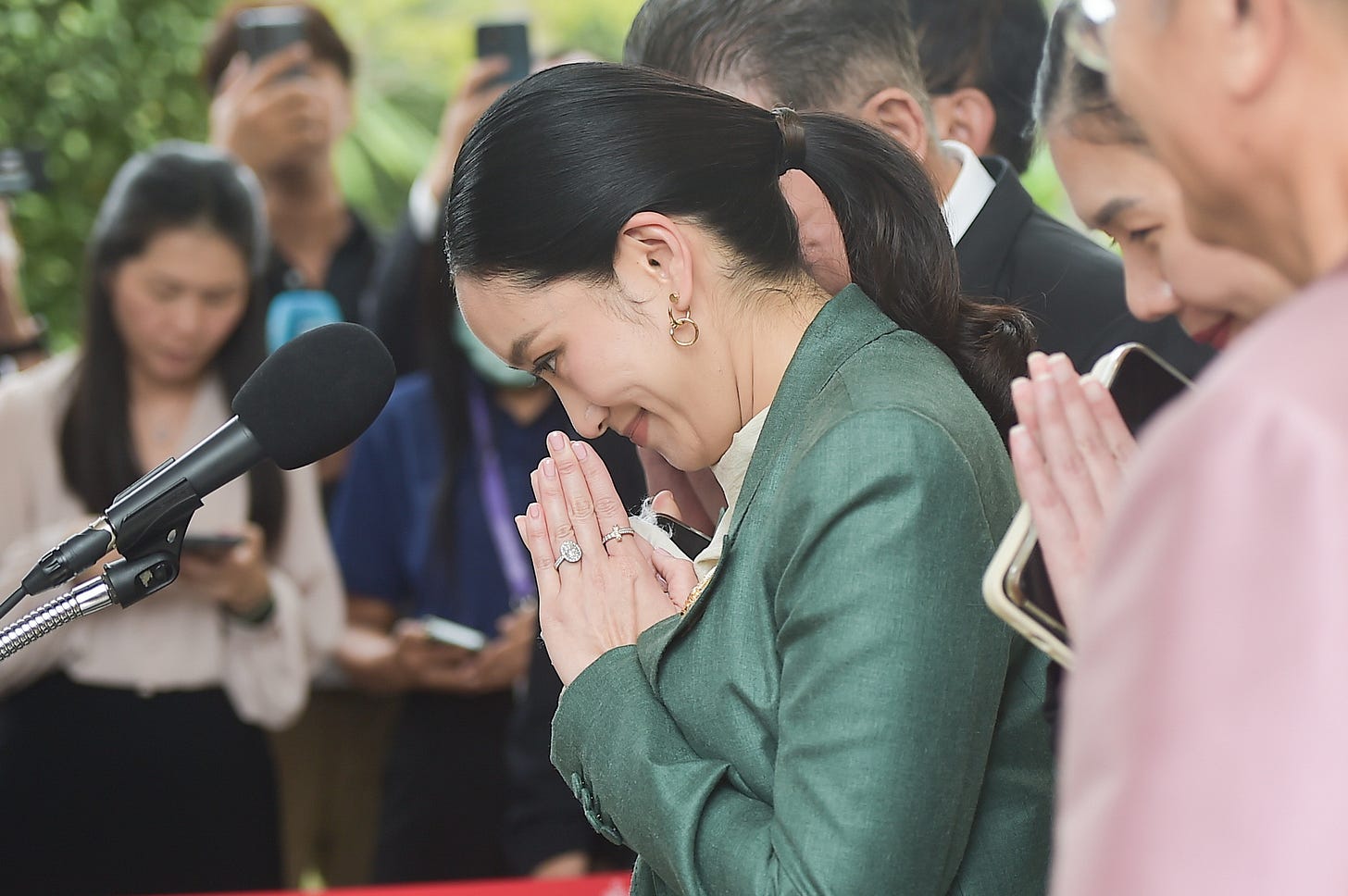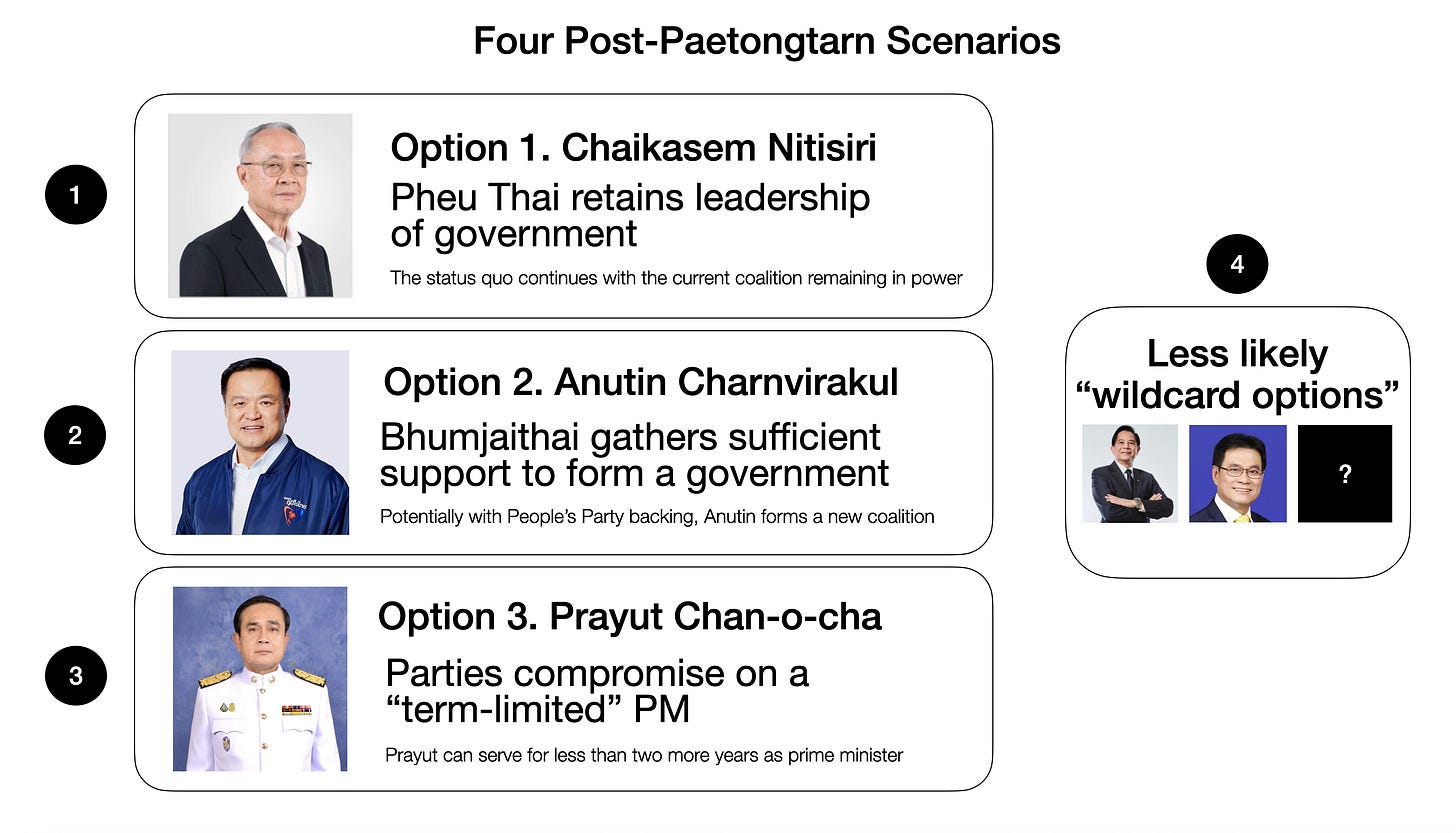Paetongtarn Shinawatra is Out. Who Will Succeed Her?
Four possible scenarios

The Constitutional Court has ruled that Prime Minister Paetongtarn Shinawatra violated ethical standards in her leaked voice call with Cambodia’s de facto leader Hun Sen, and is to be removed from office as a result.
Paetongtarn, Thailand’s 31st prime minister and the youngest in history, had served in office for only 10 months, as the Constitutional Court ruled that her premiership expired on July 1st when she was suspended as prime minister.
The case arose after a group of senators petitioned the Constitutional Court to rule on whether or not Paetongtarn’s status as a minister was still valid given that her phone call may have broken ethical standards. According to Section 160 of the Constitution, a minister “must not have behavior which is a serious violation of or failure to comply with ethical standards.”
During the phone call with Hun Sen, Paetongtarn had told Hun Sen “whatever you want, let us know and we’ll take care of it” and characterized the 2nd Region Army Commander as being on “the opposing side”: comments that critics seized as evidence of her lack of national loyalty. Paetongtarn previously defended herself by arguing that her remarks were part of a negotiating tactic — an attempt to “separate the problem from the individual.” The Court, however, ruled that Paetongtarn damaged the honor of the nation and emphasized her personal interest over the national interest.
What happens next? For the third time in the current parliament, we’re back to analyzing who will become the next prime minister. I’ve listed out four possible scenarios for the post-Paetongtarn political landscape.
Scenario 1. Pheu Thai Retains Leadership of the Government
According to the 2017 Constitution, political parties can nominate up to three candidates for prime minister at a general election. Only candidates from parties that win at least 25 seats will be eligible for selection as prime minister.
Pheu Thai has one candidate left, former justice minister Chaikasem Nitisiri. Pheu Thai had submitted three candidates in 2023: Srettha Thavisin, Paetongtarn Shinawatra, and Chaikasem Nitisiri. Srettha was previously removed as prime minister as the result of an ethical violation, and this is generally seen as a permanent bar from him holding the office again. This means that only the 77-year old Chaikasem is now eligible for the post. If the current coalition holds together — they currently hold more than 250 seats in parliament — and decides to support a new Pheu Thai prime minister, Chaikasem would logically be next in line.
However, Chaikasem also has a number of liabilities that could derail his nomination. Last year, after Srettha was removed, initial reports said that Pheu Thai would nominate Chaikasem for the top post. However, Chaikasem ran into trouble after his past comments on amending Thailand’s lèse-majesté law resurfaced, and it appeared that coalition allies would not support him. There may be concerns that he could run into legal trouble if he does become prime minister, as the Constitutional Court had previously ruled that campaigning to amend the lèse-majesté law constitutes a threat to national security.
There has also been concerns about Chaikasem’s health after he was hospitalized in 2023 due to a blood clot in his brain. In recent months he has signaled that he is healthy, going on a golf outing and giving interviews stating that his blood clot was no longer an ongoing issue. He has characterized himself as a reluctant candidate for prime minister, however, saying he would prefer someone younger take the job but that he was ready for the role if it was absolutely necessary.
It is worth recalling that many MPs had argued back in 2023 that under the parliamentary rules, a failed motion cannot be resubmitted for consideration. Former Move Forward Party leader Pita Limjaroenrat’s second nomination had been blocked precisely due to that rule. If the House upholds the same convention, this means any candidate can only be considered once. Should Chaikasem is nominated and does not win on his first try, that could mean that Pheu Thai is out of options for prime minister. With only 141 MPs out of 500, Pheu Thai is thus at the mercy of its coalition partners.
Scenario 2. Bhumjaithai Forms a New Coalition
If Chaikasem is rejected, or if coalitional bargaining ensures he is not nominated at all, Parliament would have to select from a non-Pheu Thai option. Palang Pracharath leader Prawit Wongsuwan is no longer eligible as his party now has fewer than 25 MPs., leaving four other non-Pheu Thai candidates.
Of these, the most likely may be Anutin Charnvirakul, who is the leader of the Bhumjaithai Party. Bhumjaithai is the third-largest party in parliament but left the coalition in June, so there would have to be a reconfiguration of the coalition parties for Anutin to become prime minister.
The People’s Party, currently the largest party in parliament, has stated that it is willing to vote for a caretaker prime minister who pledges to dissolve parliament within four months and will organize a referendum on amending the constitution. This could potentially circumvent the need to gain Pheu Thai support for a prime minister. The PP has pledged that it will not join any coalition even if it lends parliamentary support to a candidate for prime minister.
It isn’t clear that someone would be willing to accept the PP’s conditions, as the party has also pledged to hold a no-confidence debate if the terms are broken. But could Anutin possibly be game? Anutin has signaled increasing openness towards the PP in the past few months as they began working together in opposition. He even refused to rule out running a future coalition government together. Bhumjaithai has only 69 seats in parliament. If Anutin does make a play to become prime minister, he would need of at least one of the two largest parties. In addition, a rumor stated that in a recent meeting, Anutin asked Prawit to back him for a six-month premiership.
Anutin has also made other interesting moves in the past week, including meeting with former finance minister Korn Chatikavanij (I noted here that Bhumjaithai does not have a well-known economic policy team). There were even rumors that Bhumjaithai would be setting up a “war room” to closely watch the court ruling (something you probably would only do if you were planning to make a major move), but Anutin denied this, saying that Bhumjaithai is not going to war with anybody and only has a “love room.” Despite Anutin’s denial, in the event that Chaikasem is rejected or becomes unviable, I would closely watch what he does next.
Scenario 3. A “Term-Limited” Compromise?
Former prime minister Prayut Chan-o-cha, who led Thailand between the 2014 military coup and the aftermath of the 2023 general election, has become a privy councillor after retiring from politics. But he remains an eligible candidate for prime minister, as he was nominated by the United Thai Nation Party in 2023.
Prayut could make sense as a “term-limited” placeholder prime minister. Based on a 2022 Constitutional Court ruling, Prayut can serve as prime minister for a little less over two years, which means that he is unlikely to ever run in another election. He is also no longer officially a member of the United Thai Nation Party. Thus, his return would pose less electoral danger to Pheu Thai and the other coalition parties. As such, he may just serve for the remainder of the current parliamentary term. This could make him an attractive option for parties in parliament that are unable to agree on a new prime minister and so compromise on Prayut as an “outsider” candidate who would do the least to provide an advantage to any party at the next election.
But as I argued in my piece on the prospects of a third Prayut government, his return would pose several challenges, with a very diminished base in parliament, and he would likely have to govern with the cooperation of Pheu Thai. We do not know if Prayut would actually be open to a return to politics, especially under these difficult conditions.
Scenario 4. A Wildcard Option
Aside from Chaikasem, Anutin, and Prayut, there are two other eligible candidates:
Pirapan Salirathvibhaga, leader of the United Thai Nation Party. The UTN is currently fractured with a wing of the party that is unsupportive of Pirapan, so one wonders whether or not his power base is too small to support a credible bid for prime minister. Unlike Prayut, he is also still an active politician, so there is less incentive for other parties to back him. And crucially, he also has his own legal battles, as he is dealing with a case at the NACC. Stranger things have happened, however, and I did write here that it isn’t totally out of the realm of possibility.
Jurin Laksanawisit, former leader of the Democrat Party. He is the least likely option as he is no longer leader of his own party, and his own party faction (aligned with former prime minister Chuan Leekpai) is irreconcilably antagonistic towards Thaksin — making it highly difficult for him to garner support from Pheu Thai.
There has also been discussions of using Section 5 of the Constitution to pave the way for an outsider prime minister who is not in the bank of candidates. Section 5 states: “Whenever no provision under this Constitution is applicable to any case, an act shall be performed or a decision shall be made in accordance with the constitutional conventions of Thailand under the democratic regime of government with the King as Head of State.” One could interpret this clause to mean that anyone can be selected as prime minister if all the candidates are rejected. We’re not anywhere close to that point yet, however.
Whoever the next prime minister is, they will become Thailand’s third in as many years. He will face a political landscape that is more chaotic and uncertain than any in recent memory.



https://terresottovento.altervista.org/per-dopo-paetongtarn-quattro-scenari-politici-in-thailandia/ an italian translation
To be honest, at this point, they should just dissolve the Parliament and ask for a new mandate from the people. This is all getting to truly ludicrous levels.